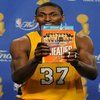dontcalltimeout wrote:I'm not a voter but i had a thought. What's the case for Kobe over Dirk?
On leading offenses, Dirk has led ATG ones and maintained a high level offense as the supporting cast shifted like musical chairs. He has all-time level gravity, and is not giving up anything to Kobe in terms of "go get me a bucket." He also has more spacing benefit due to his position. He was no world beater on defense, but was a consistent, fundamentally sound defender for way longer than Kobe. He has plenty longevity too.
Kobe was not inferior at all in terms of gravity IMO. They just operated differently. Also Kobe was a brilliant spacer, though I think Dirk was better. Cue the Laker 08-10 Kobe-Pau-Odom 3 man trio, which worked mightily because Kobe was able to draw attention out on the perimeter because of the threat of his perimeter game. Kobe also had the added strength of the ability to split/breakdown defenses from the perimeter + hit shooters+ play the P & R roll as the guard in the situation, which would normally be left to a point guard. I can entertain an argument that Dirk was the more impactful offensive player, but I don't really see evidence for it. At worst, they are pretty much equal, but if anything, we see that healthy Kobe as a #1 on a team built around him has a slight edge over Dirk (if we are focusing on ORAPM), and Kobe demonstrated also he could be a elite #2 focal option.
Defensively, I will get to this point shortly, but to put it briefly, neither Kobe nor Dirk were high value defenders in the RS, in the sense that their defense was game-changing. To me, the success of a teams defense is heavily team orientated, and therefore using defensive indicators as trump cards IMO is insufficient. For example, after watching about 8-10 games or so from 06 Lakers, and then seriously considering some recaps of the games from other sources, it became evident to me that Kobe was not, either directly or indirectly, responsible for most/more than his fair share of the points the Lakers were giving up. His bad defensive plays were visually egregious, but then he also had some very good defensive plays during the games and upped his intensity late in games. Overall though, he simply wasn't involved much in the points being given up. On the flip side, per eye test (again, I find this to be far more valuable in examining defense, hence why I am troubled by KG's defensive indicators in 05/06) he ups his level of defensive intensity and attention in the PS, and is an above average team defender and man defender. Kobe also, if you watch closely in the PS, is constantly chirping on the court on the slide-line, giving tips to his teammates on that side of that ball. Pau noted Kobe's advice helped him out a lot. Make of that what you wish..
Kobe also had two elite defensive seasons (for a perimeter player that is), one of which he was a legit elite two way player, and was the teams most valuable defender all the way through to the PS. I'm not sure Dirk can make this claim at all, and given that they were generally not game-changer defenders, this matters to me.
I know many will suggest that my take on defense is hella subjective. And it is. But a long time ago, I lost all confidence in defensive indicators as telling me anything useful about what is going on in a game. And after examining the game tape, and seeing that Smush Parker and Brian Cook, two players who played a very high amount of minuted w Kobe (and also slow footed Chris Mihm who could only block shots sometimes), were two of the major culprits in the defensive breakdowns, my convictions were strengthened.
So for me, Dirk's RS defense does not move the needle for me, and in the PS, I don't see things shifting.
As for Kobe's strengths over Dirk. I will try and put things together, but in short. While both Dirk and Kobe were resilient playoff performances, Kobe IMO was slightly better (talking about their primes here). This gap widens little (though still not that large) when facing elite defenses (and by elite, I mean non- historically GOAT defensive teams, something that Kobe had to face 3 times in the playoffs- 04 Spurs/Pistons in the GOAT defensive era & 08 Celtics to Dirk's Nil). I also think Dirk for half of his prime, could be neutralized by long-ish athletic defenders, while I feel that prime Kobe could only be neutralized by very elite/GOAT like defensive teams.
Also Dirk's 06 finals performance, in which his team blew a 2-0 lead with HCA, being guarded by Udonis Haslem and James Posey, two dudes he had several inches on, and by a team who was not at all historically great on defense (like the 04 pistons, or the 08 Celtics- two teams Kobe faltered against) would count against him, as would the infamous 07 series with the Mavs as a #1 seed 65+ win team. He was getting doubled, sometimes trippled again, but he was being guarded by dudes who were undersized. I think Dirk's "low" moments are far more damaging than Kobe's "low moments". Again, just my opinion.
They are both great players IMO, and on an objective level, I can see someone making a good case for Dirk. But getting nitpicky, I think Kobe has the slight edge.


























